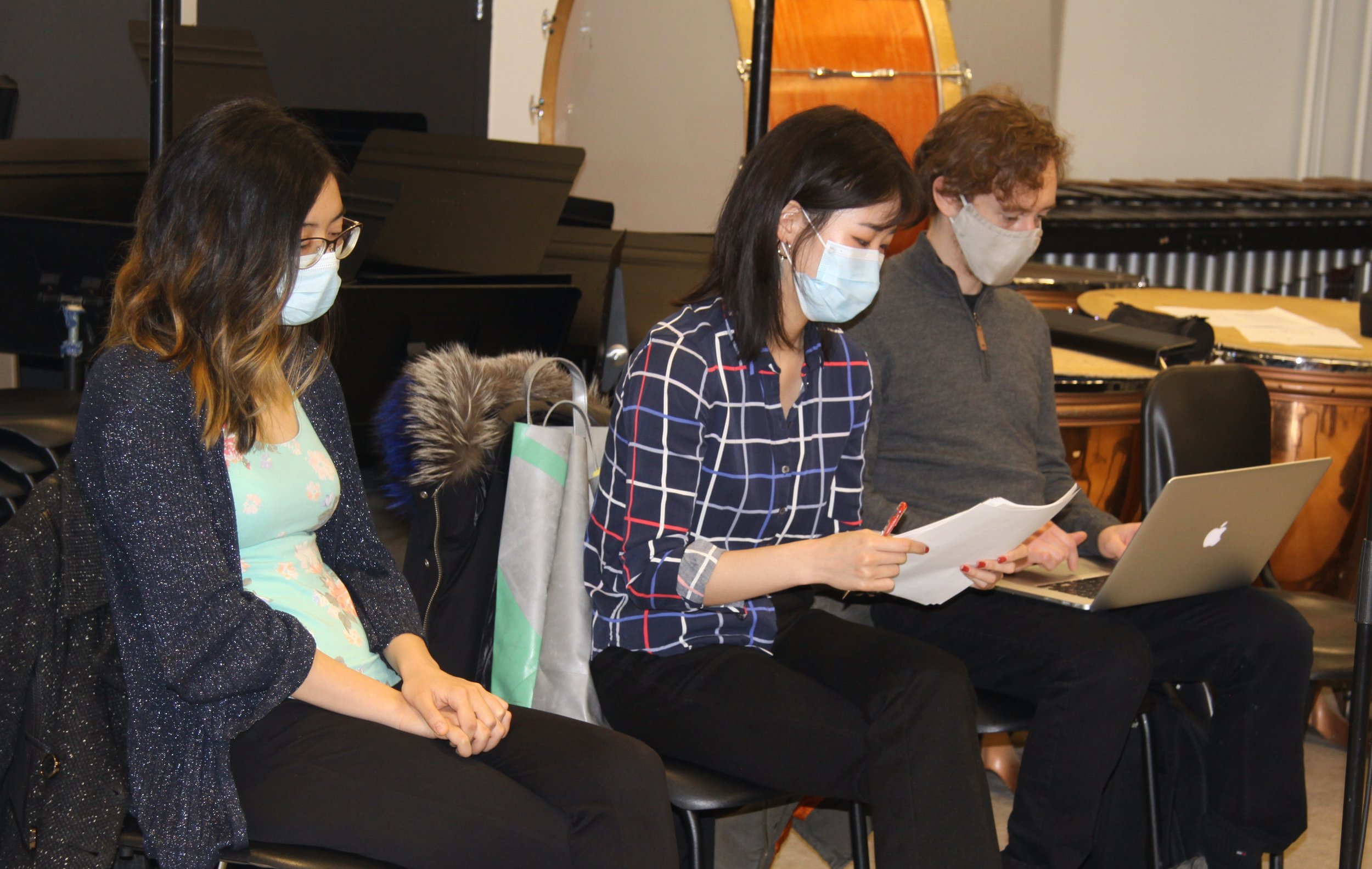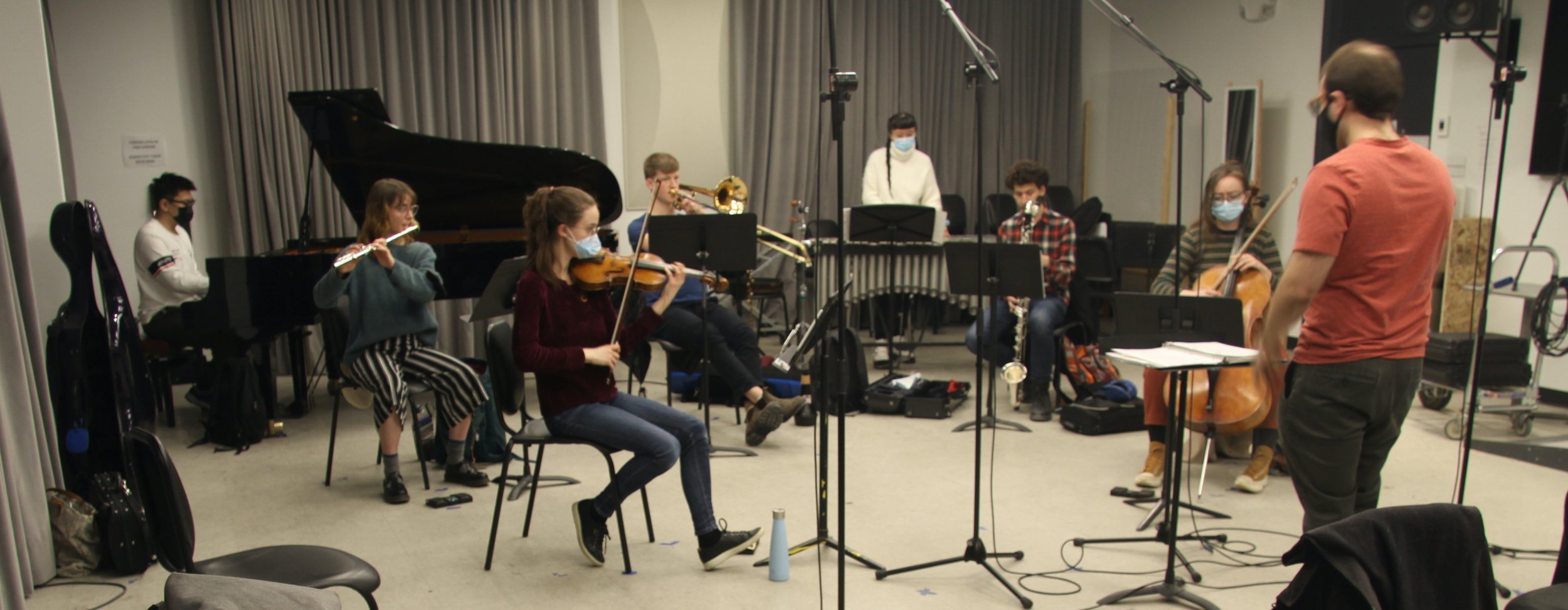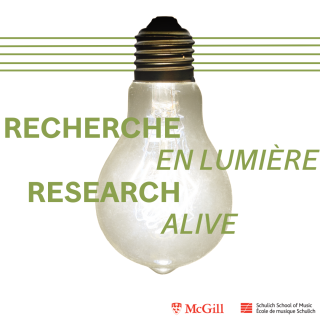Newsletter no. 17
Analysis, Creation, and Teaching of Orchestration Project
April, 2022
Newsletter no. 17 — Subscribe here
TOR Spotlight
Amazing Moments in Timbre
Two new "Amazing Moments in Timbre" essays have been published: Michelle Sulaiman's analysis of Minnie Riperton's use of the whistle register in Lovin’ You and Carter Miller's exploration of timbre as an impassioned argument in Elizabeth Maconchy’s String Quartet No. 10.
New Bibliographies Available
A new bibliographic resource is available on the Timbre and Orchestration Resource, featuring:
A wide range of timbre-related bibliographies created by Stephen McAdams and students at the Music Perception and Cognition Lab – Abstracts for these sources will pop up when you hover over the author(s) name(s)!
Bibliographies for Extended Techniques and Extended Vocal Techniques, created by students of Laurie Radford
If you'd like to submit your own bibliography for publication on the TOR, please write to the webmaster.
CREATIONS AND PRODUCTIONS
CORE Project Presentations & Concerts
Pieces composed for the CORE Project at the University of British Columbia, McGill University, and the University of Montreal will be featured on concerts taking place at these institutions in April. The concert at McGill will be preceded by a round table led by Stephen McAdams and Guillaume Bourgogne with a panel of student composers and the CORE septet playing live as part of the Research Alive lecture series.
For programs to each concert, click here [link no longer available]
University of British Columbia
April 1 (12pm Barnett Hall) & April 6 (2pm Belkin Art Gallery)
Pieces by Mariah Mennie, Michael Kirchmayer, & Darren Xu
University of Montreal
April 14 (7:30pm, Faculté de musique, Salle Claude-Champagne)
Pieces by Miko Sabatino & Snezana Nesic
McGill University
April 8 (Schulich School of Music, MultiMedia Room)
Round table at 5pm; Concert at 7:30pm
Pieces for CORE Round 1 by Alexander Blank, Pedram Diba, & Quentin Lauvray
Pieces for CORE Round 2 by Jihyoung Lee, Anita Pari, & Louis-Michel Tougas
PUBLICATIONS
New publications involving ACTOR members have been made available:
Noble, J. (2022). The career of metaphor hypothesis and vocality in contemporary music. Interdisciplinary Science Reviews,* 1-20. https://doi.org/10.1080/03080188.2022.2035108 *This special issue was edited by ACTOR member Andrew Hugill, and Noble's article features spectrographic images created by J Marchand Knight.
Reymore, L., Beauvais-Lacasse, E., Smith, B.K., & McAdams, S. Modeling noise-related timbre semantic categories of orchestral instrument sounds with audio features, pitch register, and instrument family. Frontiers in Psychology. 13:796422. https://doi.org/10.3389/fpsyg.2022.796422
Kazazis, S., Depalle, P. & McAdams, S. Interval and Ratio Scaling of Spectral Audio Descriptors. Frontiers in Psychology, 13:835401. https://doi.org/10.3389/fpsyg.2022.835401
Zeller, M. (2022). Klangfarbenmelodie in 1911: Timbre’s Functional Roles in Webern’s Opp. 9 and 10. Music Theory Online, 28(1). https://mtosmt.org/issues/mto.22.28.1/mto.22.28.1.zeller.html
For the full bibliography, please visit ACTOR publications.
PRESENTATIONS
How does timbre stick? Timbre encoding in memory
Behrad Madahi presented on his research during the Doctoral Colloquium at McGill University on April 1. His presentation, titled, "How does timbre stick? Timbre encoding in memory," focused on recent experiments addressing the interaction of the auditory features involved in the timbre perception and retention. In the first experiment, Madahi synthesized tones with controlled spectral and temporal envelopes and examined the perceptual dimensions that correlate with these features. Other experiments were designed to analyze the extent to which each dimension can be recalled from short-term memory and the role the binding of these features can play in the retention of timbre. Results show the significance of temporal features in timbre perception and auditory short-term memory compared to the spectral content of timbres. Madahi also discussed the binding of these auditory features in terms of shared resource allocation memory models and as compared to that of visual short-term memory.
Crossmodal correspondences in composing and listening to music
ACTOR student member Chelsea Komschlies presented during the Research Alive Lecture series as an awardee of the Student Prize. The presentation was titled, "Crossmodal Correspondences in Composing and Listening to Music," and took place on March 16 in Tanna Schulich Hall at McGill University. The event is available to watch online.
Music Performance Markup Workshop
19 May | 1:00-3:30pm
Dalhousie University
The Music Encoding Conference (May 19-22, at Dalhousie University, Halifax, Canada) will feature a Music Performance Markup introductory workshop entitled "Encoding Musical Performances," led by Axel Berndt. The MPM Toolbox graphical editor and analysis toolkit for musical performances has applications that range from audio and performance score analyses to the creation of rich expressive performances in music production contexts. A runnable JAR file is released on a GitHub repository.
The half-day, 3-hour workshop gives practical introduction to the format. Participants will familiarize themselves with the MPM Toolbox during the course of the workshop, will have the opportunity to experiment and create their own performance encodings, and give feedback that will motivate future development. A further workshop is planned in the Edirom Summer School (Paderborn, Germany), 5th-9th September 2022.
MEC'22 will also host a panel discussion on "Sharing MEI: Common Semantics in Diverse Musics?" Knowing the limitations of music encoding standards today—especially with regards to non-traditional music representations, electroacoustic music and musical performance - we will discuss future directions of and beyond the MEI standard.
American Composers Orchestra
17-21 May
Tucson
Chelsea Komschlies will be participating in the American Composers Orchestra 2022 EarShot Orchestra Readings with the Tucson Symphony in May. Her piece, A Hidden Sun Rises, is meant to depict a vision of a spiritual sunrise over the course of six minutes, crossmodally encoded with gradual brightening, enlarging, and spinning by way of timbre, orchestration, and harmonic techniques. She conceived of the piece synesthetically as a rainbow, beginning with dark, glittering violet and ending finally at the other end of the spectrum in brilliant red gold. Komschlies will also be participating in outreach programs for young composers as part of the events. Read more
PROJECT UPDATES
Y4 Workshop
Hotel booking
You can now book your hotel room to participate in the Y4 ACTOR Workshop! Until May 9, you can benefit from special rates at the University of Calgary Accommodations and Events hotel (former Alma Hotel), located on the University of Calgary campus, 150m from the Rozsa Centre where most of the workshop will take place July 9-11. Bookings can be done online or by phone until 9 May, 2022. After this date, rates may change and reservations will be contingent on room availability. To verify rates and book your stay, check the Reservation Information sheet. Should you have any questions, please contact Andre Oliveira.
François de Médicis
A full professor at the Université de Montréal, François de Médicis’ recent publications include the monograph, La maturation artistique de Debussy dans son contexte historique (1884-1902) (Brepols 2020) and a critical edition of the Violin Sonatas by Camille Saint-Saëns (Bärenreiter 2021) with Fabien Guilloux. He has co-edited two collections of essays: Debussy’s Resonance (2018), with Steven Huebner, and Musique et modernité en France, 1900-1945 (2006), with Sylvain Caron and Michel Duchesneau. Jointly with Caroline Rae and Danick Trottier, he is currently preparing a third collection, Stravinsky and France. His articles have appeared in Acta Musicologica, Music & Letters, Il Saggiatore musicale, Intersections, STM-Online, and Enciclopedia della musica (Einaudi), as well as in collections of essays published by University of Rochester Press, Actes Sud, Vrin, Symétrie, the Sorbonne, Dohr, l’Harmattan, etc.
de Médicis is currently at work on a book that centers on Stravinsky’s musical language in the years 1911–1925 and its impact on several French composers (Debussy, Ravel, Koechlin, les Six). He is also involved in an investigation into Québecois music from 1900 to 1950, with emphasis on the musical figures of Alfred Laliberté, Auguste Descarries, and Rodolphe Mathieu. His project with ACTOR seeks to determine the extent to which a true French tradition of orchestration may have existed between 1870 and 1929. The research centers on Debussy and combines various perspectives: the discourse on orchestration by Debussy and his contemporaries, the analysis of scores, and the examination of orchestration treatises by Berlioz, Gevaert, Widor, and Charles Koechlin.
Satellite Meeting Funding
The purpose of the Satellite Meeting Funding is to increase ACTOR's visibility at international conferences by supporting the organization of adjunct meetings involving at least 2 ACTOR members. A maximum amount of $300 (CAD) will be provided. Applications will be accepted continuously, but must be submitted at least two months prior to the conference date. For more information on how to apply and to access the online application form, visit ACTOR Funding Opportunities.
Student Exchange
The Student Exchange Funding aims to support ACTOR student members conducting research within the ACTOR project's mandate at an ACTOR partner institution. A maximum of $2,500 CAD per applicant in support of travel and living expenses will be provided. The minimum length of the exchange is 2 weeks. Exchanges must be between ACTOR partner institutions. Applications may be submitted online by 5:00pm (EDT) on April 15, 2022 for exchange visits from July through December. Please note that before submitting an application it is important to verify the travel restrictions at both the home and host institutions/countries. In order to facilitate the application process and encourage more students to apply, the letters from the home and the host institution will no longer be required. Check Student Exchange Funding for more details.
Collaborative Student Project Grant
We are pleased to announce that the Collaborative Student Project Grant will henceforth be offered on an annual basis. As with last year, up to four projects will be funded at $8,000 (CAD) each. The grant is for pairs of ACTOR student members (any level) from different ACTOR institutions (at least one applicant must be from an academic partner institution) to work on collaborative projects. The deadline for submission is April 15, 2022. More information here: ACTOR Collaborative Student Project Grant.
Postdoctoral Fellow positions available!
ACTOR is looking for two bright minds to join its team of postdoctoral researchers. Unfortunately, the contracts of current postdocs Lindsey Reymore and Matthew Zeller will end on August 31, at which time they will be passing the baton to new fellow researchers.
The postdoctoral fellows will work primarily on either the Analysis Axis or the Output Innovation Axis. They will be involved in project coordination and research on orchestration in the fields of music theory, musicology, psychology, orchestration pedagogy, and compositional practice. They will participate in the development of methods for evaluating the impact of this research in those domains and will co-supervise graduate and undergraduate students.
Applicants must have received their doctorate (PhD, DMA, DMus) within 3 years of the starting date of the fellowship. They should submit a cover letter, CV, and 3 representative papers (or 2 papers and a composition for the Output Innovation Axis PDF), and arrange for 3 letters of reference to be sent to actor-project.music@mcgill.ca. Applications will be reviewed as of April 15, 2022 until the position is filled. The ideal start date is August 1, 2022 to provide overlap with the incumbent PDFs, but September 1, 2022 is the latest start date.
For the complete details, visit Postdoctoral Fellow Positions
Call for activities - Y4 Workshop
With the Y4 workshop ahead, we would like to invite all ACTOR collaborators to submit either or both of the following to Andre by April 15:
Proposals for lightning talks on ACTOR Strategic and Research-Creation Projects. Proposals should include a title and 3-4 sentences about the project. These will be selected by the Executive Committee based on various criteria such as their relevance to ACTOR, number of members involved, number of ACTOR partner institutions represented, interdisciplinarity, and originality of the project. Lightning talks on other ACTOR-related projects might also be considered, depending on the number of proposals submitted.
Suggestions for new, perennial workgroups. Please send a brief description of a suggested topic that could generate open research questions around which you would like to gather a group for lively discussion and the planning of concrete goals for the next year, including a list of potential participants.
For more information, please see - Call for activities - Y4 Workshop
Contributing to TOR
We encourage all ACTOR members to share their research (in progress or completed) with the ACTOR community via the Timbre and Orchestration Resource (TOR). This may include an article, blog, or video submission containing information on project ideas, experiments, external resources/tools, teaching materials, analysis, or anything related to timbre and orchestration that you deem relevant. We believe that only in doing so will we truly benefit from the expertise and feedback from the world-class team of scientists, artists, and humanists involved in ACTOR. If you have any questions about the submission process, please contact Kit Soden. Read more










